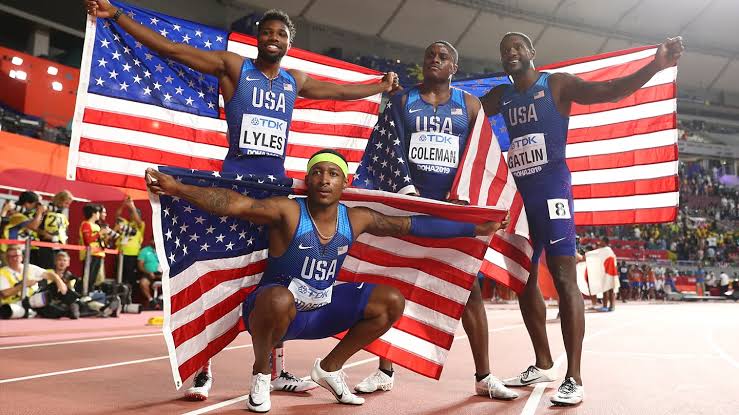
But wherever one looks at Stade de France during this Olympic meet, one thing is certain: Americans are winning.
During an exciting and action-packed Wednesday night, the Americans won three more medals: Quincy Hall’s gold in the 400 meters, Katie Moon’s silver in the pole vault, and Kenneth Rooks’s thrilling second-place finish in the 3,000-meter steeplechase. The Americans are clearly dominating this meet.
“It has been really inspiring,” Rooks said. “It’s been electric.”
Nineteen medals, including six gold ones, have been won by American track and field athletes. No other nation has won more than two gold medals or six medals in total.
The United States track and field team is getting close to securing its 26th medal from Tokyo, needing just one more gold to match the seven it took home in 2021. Not to mention, the American men have already won three gold medals here; these men never made it to the top of the podium in the track events at the Tokyo Olympics. There will probably be more on Thursday, as Noah Lyles competes in the 200 meters and Grant Holloway in the 110 meters of hurdles.
The United States is ahead in the gold medal count and dominating in total medals. #paris2024 #olympics pic.twitter.com/nXjP5kk2rp
— Peak One Sports Network (@PeakOneSports) August 6, 2024
The American competitors claim that, whether they are watching from the stands, in the call room, or back in the Olympic Village, they are thriving off the accomplishments of their compatriots after six days of competition at Stade de France.
Along with other American athletes, Rai Benjamin, who competes in the 400-meter hurdles on Friday, witnessed Lyles win the 100-meter competition on Sunday. “After that, it was bananas in there,” he remarked.
The U.S. Leads the Athletics medal tally with 16 medals including 5 gold going into day 6 finals 🇺🇸
Here is the current top 10 👇🥇🥈🥉 pic.twitter.com/q508SxI71n
— RoriDunk (@FitzDunk) August 7, 2024
“It seems like we’re just feeding off each other on a subconscious level,” he remarked. That’s not all subconscious, though. Prior to this Wednesday’s final, Rooks reported that Benjamin made a special effort to support the steeplechase racer.
“He promised to warm up the track for me,” Rooks remarked. On Wednesday night, just one hour had passed since Benjamin’s semifinal race. He thus did a fantastic job of getting the track warmed up.
There is still momentum that has been generated by the flood of medals. Tuesday night, American track stars jumped and cried out when one in the village witnessed Cole Hocker’s last-ditch effort to win the 1,500 meters. Benjamin made a joke a day later about not being able to speak because he had stopped screaming for Hocker.
Masai Russell, one of the favorites in a crowded 100-meter hurdles field, said after her semifinal on Wednesday, “I’ve been itching to run, just because I’ve seen everyone do their thing — get gold medals, get unexpected gold medals.” When I woke up this morning, that was on my mind. “USA is doing a big one,” I thought.
Not counting the 1904 St. Louis Games — when the United States won 67 of 74 possible medals and only 11 countries competed — the U.S. standard for Olympic track and field success remains Los Angeles 1984. On home soil, the Americans won 16 gold medals and 40 total.
Would the Americans dispute that? These ten more to tie 1984. If you go through the events list, you could see: Potential gold medal opportunities are available in the men’s 200, men’s 110, women’s 100, women’s 400, women’s shot put, women’s long jump, men’s 400 hurdles, heptathlon, and all four relay events.
Wednesday perfectly captured the American approach to this Paris meet: identifying the podium events in where they are strongest while putting up unexpected finishes in events where they may have been undervalued.
Would the Americans dispute that? These ten more to tie 1984. If you go through the events list, you could see: Potential gold medal opportunities are available in the men’s 200, men’s 110, women’s 100, women’s 400, women’s shot put, women’s long jump, men’s 400 hurdles, heptathlon, and all four relay events. Wednesday perfectly captured the American approach to this Paris meet: identifying the podium events in where they are strongest while putting up unexpected finishes in events where they may have been undervalued.
The steeplechase race gave the evening a thrilling conclusion. The 24-year-old BYU recruit, Rooks, had only set the 37th-best time in the world so far this year, and not many had predicted him to be in the top three. In the early going of the race, he was most definitely not changing any minds.
With just 3.5 laps remaining, he was really still in the lead at 4 minutes, 40 seconds into the race. At about 5:20, he began to work his way through the group.
About seven minutes into the final circuit, he found a new gear and surged to the front. When the leaders turned for the last stretch, he took the lead at the last water jump.
With two Olympic gold medalists from Morocco (Soufiane El Bakkali) and Ethiopia (Lamecha Girma, the world record holder who earned silver in Tokyo) in the field, this was not the race that anybody had anticipated. El Bakkali did indeed pass Rooks, but mayhem broke out in their wake. Girma fell to the ground headfirst after his knee caught the last obstacle. On the track, he seemed to be frozen in place. After a while, he was removed on a stretcher and brought to a hospital for assessment.
In the meantime, Rooks held off a late surge from Abraham Kibiwot of Kenya to finish in second place in 8:06.41, 0.36 seconds behind El Bakkali and a full 10 seconds faster than his previous best time. “It’s simply a dream,” he declared. “Sometimes, like right before bed, you think about times like this, and it’s just amazing to be able to live it.”







I’m extremely pleased to uncover this site. I want to to thank you for ones time just for this wonderful read!! I definitely liked every part of it and I have you book-marked to look at new things in your site.